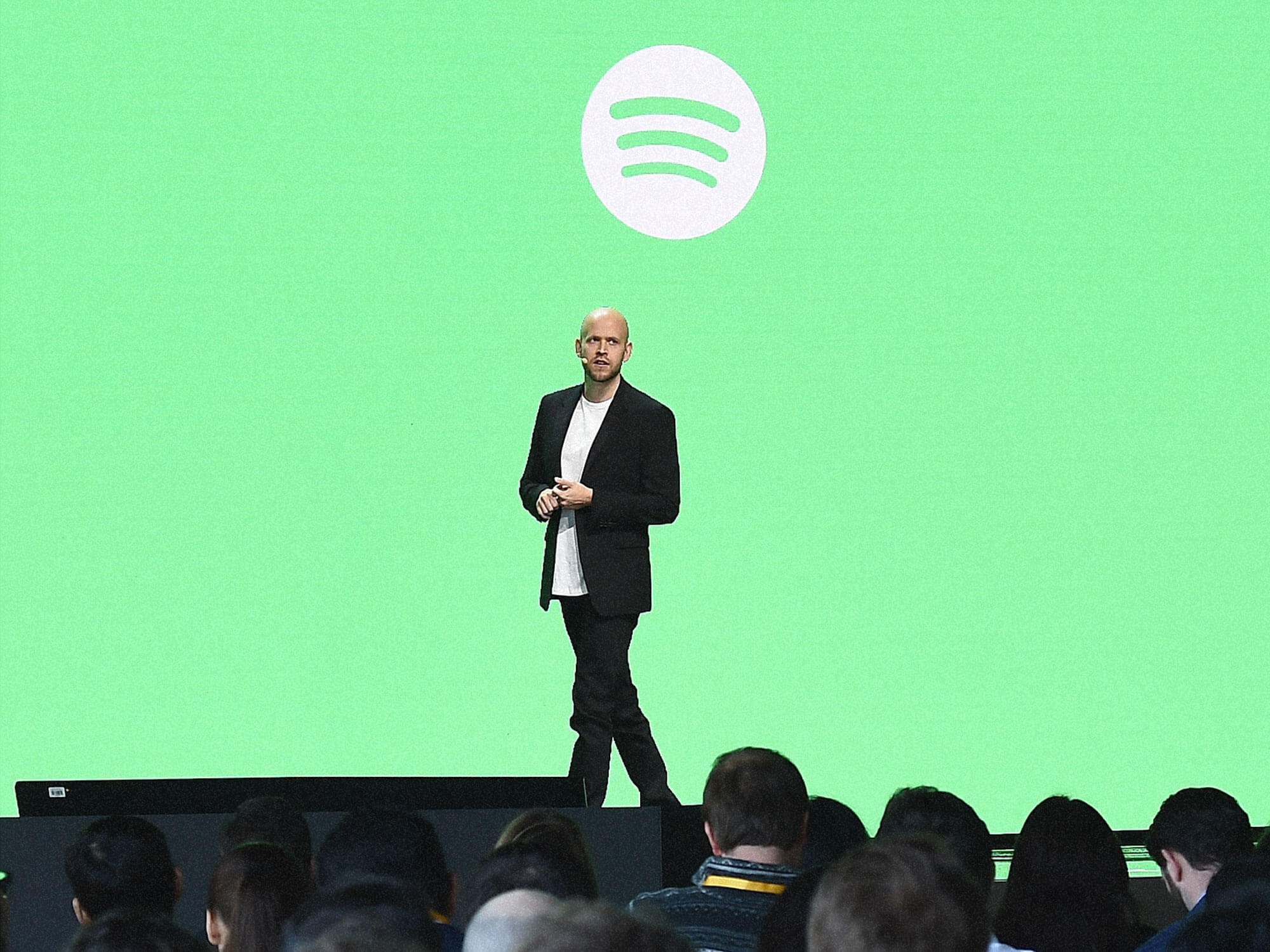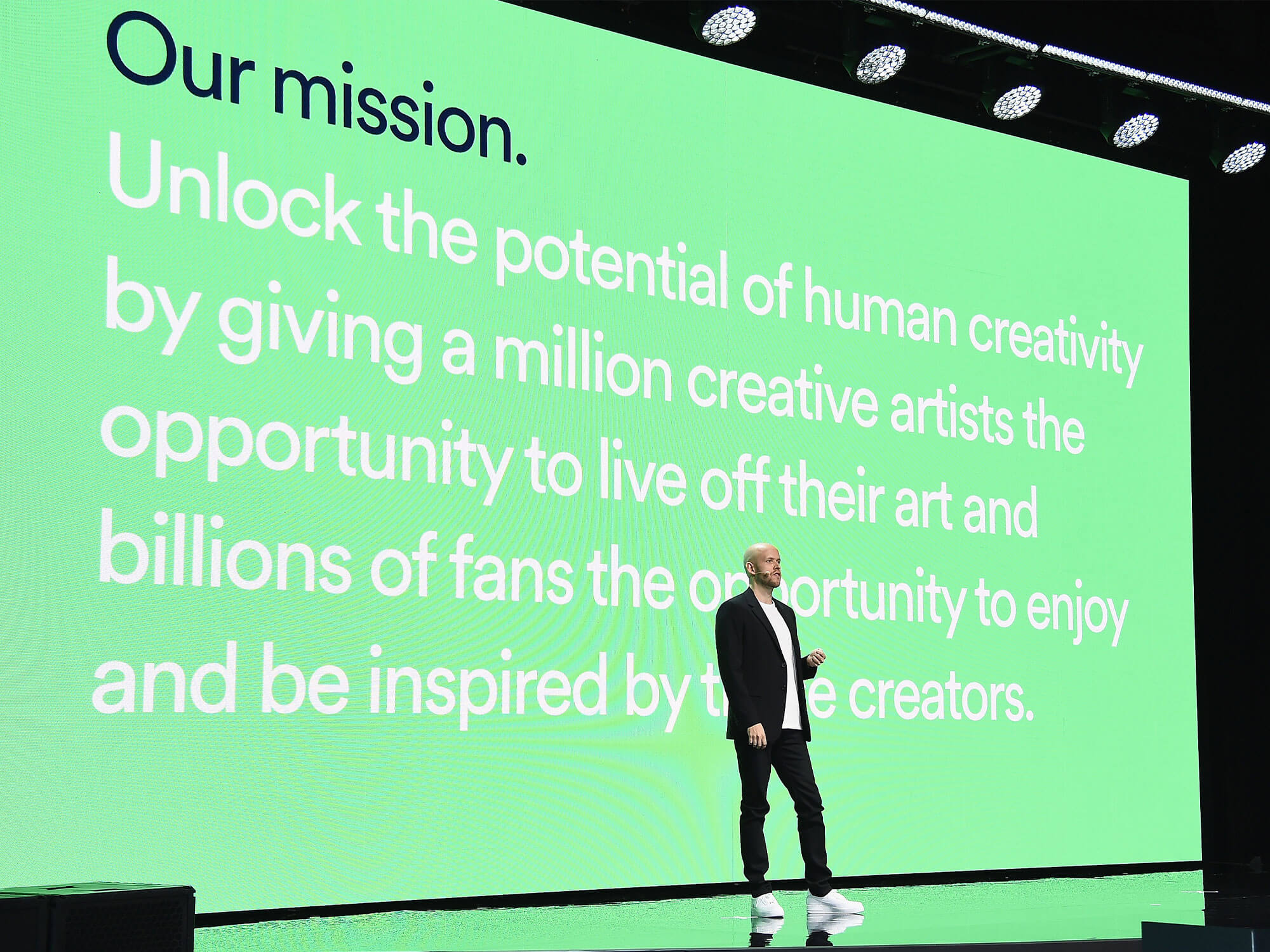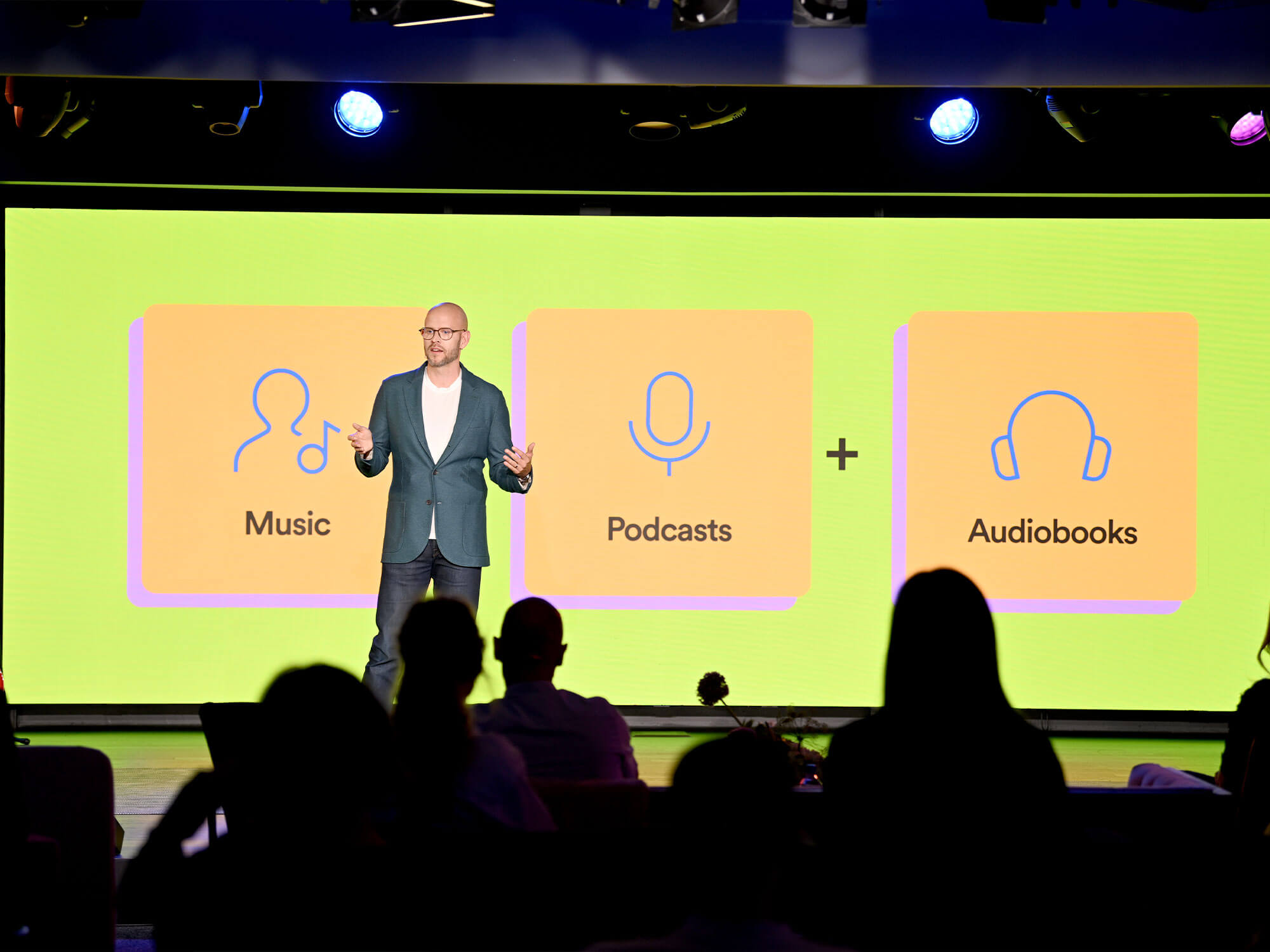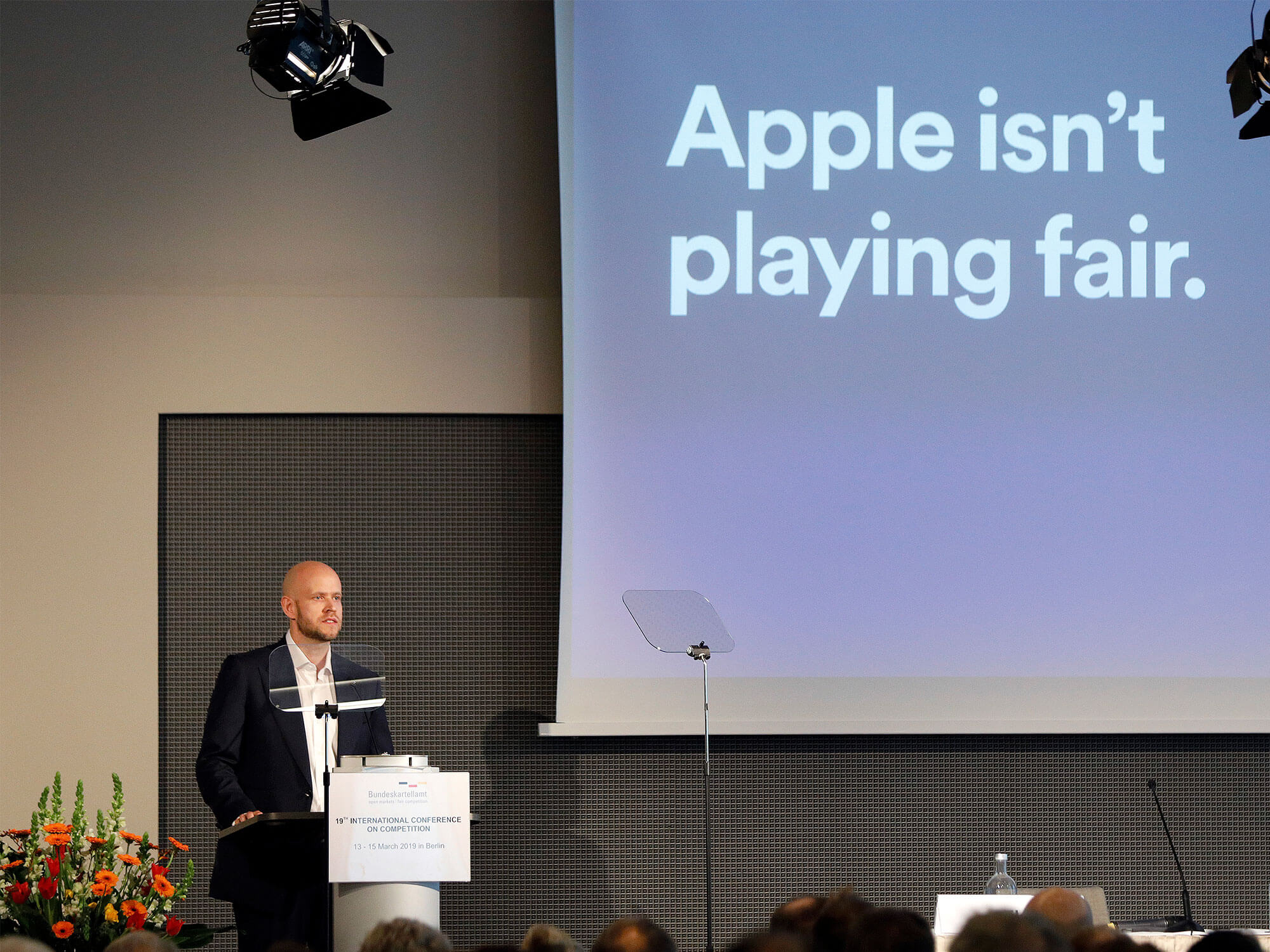No, Daniel Ek, the music industry isn’t like professional football
Spotify paid out over $9 billion to the music industry in 2023. But its CEO seems to continuously distance himself from the musicians whose work his business depends on.

Spotify Daniel Ek speaks onstage during Spotify Investor Day at Spring Studios on March 15, 2018 in New York City. (Photo by Ilya S. Savenok/Getty Images for Spotify)
I’m sure Daniel Ek has a better grasp on the inner workings of the music industry than I do. The Spotify CEO probably has immense access to listener statistics and data, and a deeper understanding of the company’s royalties and revenue systems than most. But his apparent inability to empathise with artists, of all levels, is on frequent display and his input to the music industry’s discourse is often perceived by musicians as tone-deaf.
Ek’s latest gaffe came last week in the form of a selfie video posted to social media. In it, he boasted that Spotify “paid out more than $9 billion to the music industry in 2023” and then compared the music industry to professional sports. “The best analogy that I would have is that the music industry… is like professional sports,” said the Swedish CEO, who once tried to purchase Premier League club Arsenal.
“If you take football, it’s played by hundreds of millions of people around the world. But there’s a very, very small number of people that can live off of playing soccer full-time. FIFA tells us that there are about 100,000 people who can make it in football or soccer. [And there are also] hundreds of millions of people that are trying to make it in the music industry.”
He’s essentially saying that not all musicians will turn a profit. That’s not news – music-making is a rewarding hobby for many who accept that they’ll never reach superstar status. That’s been true for as long as people have been paid to write and perform music.
But by comparing music-making to professional football, Ek has presented a flawed analogy that hobbyists and professionals alike are queuing up to correct in the most robust terms.
Why? Because the statement leans harder into a competitive ‘tech bro’ mindset than into the core values shared by most artists. The music industry might be competitive but art should not be a competition.
But let’s humour this analogy for a moment. There may well be 100,000 professional footballers, but the average player in the lowest UK professional division reportedly earns £750 a week, or £39,000 a year, before any potential sponsorship deals. Meanwhile, on Spotify in 2023, there were around 200,000 “professional or professionally aspiring artists,” and in 2022, the top 50,000th artist on the platform earned $12,584 annually.
So I dunno, Dan, it feels like I’d be better off trying to get a regular paycheck out of Rob McElhenney and Ryan Reynolds at Wrexham than I would be trying to make a living from Spotify streaming revenue.

Image: Ilya S. Savenok/Getty Images for Spotify
The true aggravation for musicians, though, is that Ek’s statement follows other claims and blunders that seem to further distance him from the platform’s musicians – the people whose creative labour Daniel Ek’s company relied on to get where it is today.
Notably, in late 2023 — a few years after claiming that fast-produced albums will trump thoughtful, considered albums made over several years — he confirmed that Spotify would not ban music made by AI. At a time when OpenAI is giving media creators a glimpse of their potential demise with ChatGPT, DALL-E and Sora AI, Ek’s Spotify is teetering on doing the same.
It feels like Spotify cares about audio but not about music. I have no doubts that Ek and Spotify’s employees are avid music lovers and find deep value in sonic art. I’m sure that Ek’s dream is for all artists to be paid better for their artistic efforts. But the streaming model has changed the way artists are expected to release music, and Spotify’s pivot to podcasts and audiobooks felt like a kick in the teeth for the artists without whom Spotify wouldn’t exist. After all, who can explain giving $100 million to Joe Rogan when musicians who have worked their whole lives to build small but previously sustainable careers are told their labour is only worth $0.004 per stream?

Music creators are worried that Ek’s Spotify is preparing us for AI-generated music to infiltrate our libraries; where ‘mood’ playlists aren’t made by a collection of lo-fi hip-hop makers and ambient artists, but by algorithms that are trained on those genres. Ek and Spotify might not be thinking of doing that, but you can’t help but feel that’s where we’re heading.
This weekend, trailblazing UK producer James Blake addressed this, too: “If we want quality music somebody is gonna have to pay for it. Streaming services don’t pay properly, labels want a bigger cut than ever and just sit and wait for you to go viral, TikTok doesn’t pay properly, and touring is getting prohibitively expensive for most artists. The brainwashing worked and now people think music is free.”
“And by the way,” Blake continued, “since it’s cheaper to produce fast, synthetic music to drop on streaming every week to capitalize on the strengths of the model, watch how the model is preparing you for AI-generated music that pays musicians nothing at all.”
And by the way, since it’s cheaper to produce fast, synthetic music to drop on streaming every week to capitalize on the strengths of the model, watch how the model is preparing you for AI generated music that pays musicians nothing at all.
— James Blake (@jamesblake) March 3, 2024
Can you think of any football players, amateur or professional, who are expressing concerns about being replaced by AI? I don’t think Boston Dynamics robots are going to be shoulder-to-shoulder with Erling Haaland or Mo Salah anytime soon.
On top of this, Spotify is said to have enabled some practices that further create an unfavourable climate for many musicians. In 2023, Benn Jordan spoke at length about the alleged money laundering schemes that centre around Spotify and the royalty model the company runs. In fairness, Spotify has responded in The Guardian that such streaming exploitations are “an industry-wide challenge and Spotify has been working hard to address this issue…Less than 1 per cent of all streams on Spotify have been determined to be artificial and those are promptly mitigated prior to any payouts”
Still, Jordan asks: “How much of your money as a musician is giving a money launderer or con artist a 3 to 1 return?”
Meanwhile, by the way, Ek sold $57.5 million worth of his Spotify shares last month. Cool.
The wider streaming landscape and the modern music industry in general is a flawed environment that makes it harder than ever for artists to make a living from their art. But Spotify has driven this race to the bottom – the company has never turned an annual profit while globalising a business model that has completely changed the way we consume music, likely forever.

Obviously, the concept of music streaming is amazing and it has generated opportunities for many that would have perhaps been unheard of in a pre-streaming era. But by telling the world that you can have the entirety of recorded music for what was initially five bucks a month, the company’s backed itself into a corner.
Because it wants to offer all music, rather than a curated selection like Netflix or HBO, it’s forced to cooperate with major labels who are far more corporately combative than Spotify tends to be — at least, according to ex-Spotify employee Tony Lashley, who went on to found Marine Snow. That results in too much revenue being diverted away from independent artists and into the deep pockets of major labels.
Making a sustainable income from music should be more accessible than ever but, instead, it’s never felt so far away.
So, yes, Daniel Ek. The music industry might well be like football in the sense that it has professionals and amateurs. But when it comes to fair payouts, grassroots schemes, and the pay-to-win model, the only likeness is that you’d have more chance of scoring in a match with five Alisson Beckers on the goal line.